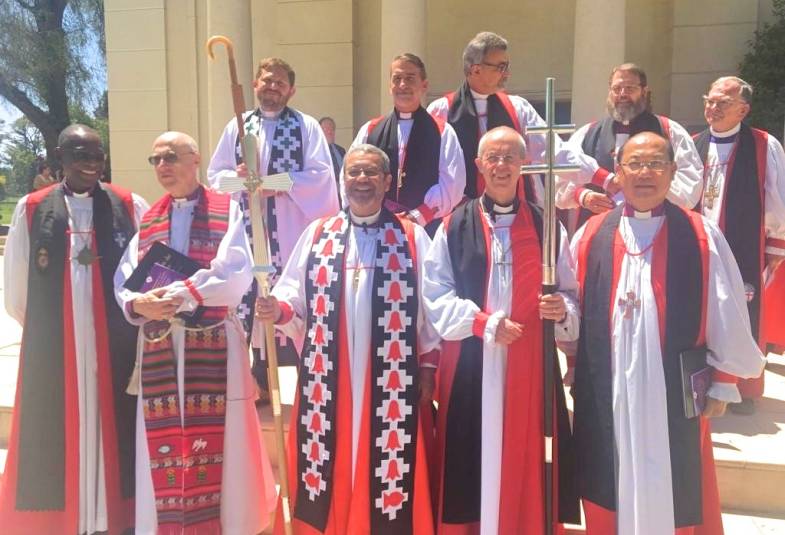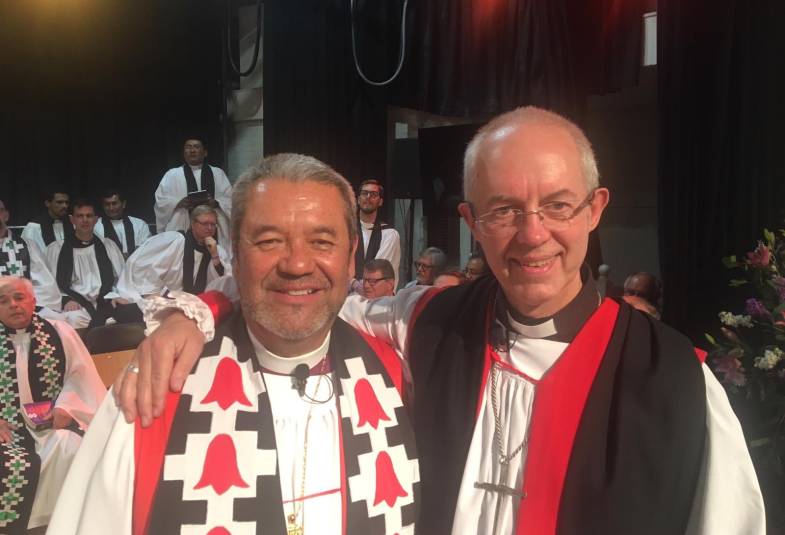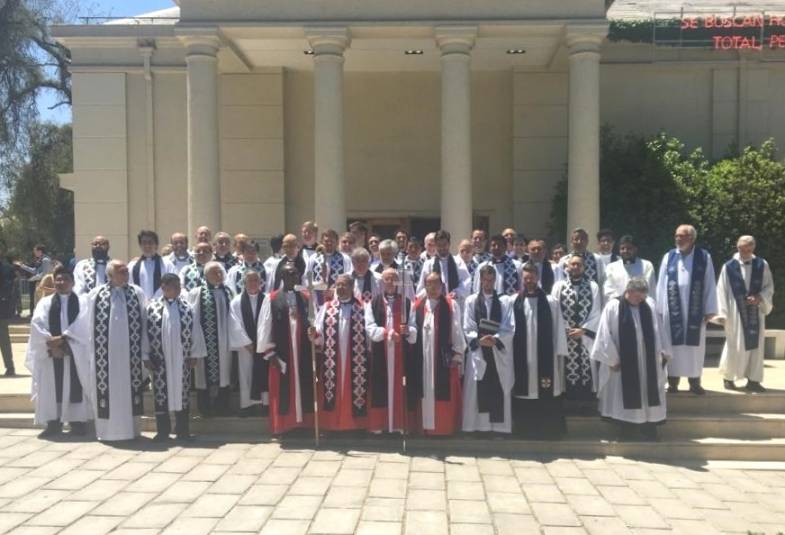05/11/2018
Archbishop Justin Welby preached this sermon yesterday at the inauguration of the Iglesia Anglicana de Chile as the 40th Province of the Anglican Communion.

The Archbishop of Canterbury preached and presided at the inauguration of the new Anglican Province of Chile in Santiago yesterday, marking the birth of the 40th province of the Anglican Communion.
Bishop Héctor Zavala Muñoz, more commonly known as Bishop Tito, became Primate of the Iglesia Anglicana de Chile (Anglican Church of Chile).
Read the Archbishop's sermon:
Thank you for this wonderful invitation and the great privilege it is to preach at the launching of a new province. Thank you, Archbishop, Héctor Zavala, for your welcome and hospitality, and thank you for your years of wonderful service to this church in Chile, one of the shining lights of the Anglican Communion, which now burns yet more brightly as a challenge and example to us all.
It is truly a gift of God to be here with you and to experience again the life, the fire, the purpose and the perseverance of this church.
And those indeed are some of the themes of the readings we have heard today. They begin with holiness, but holiness not simply as an aversion to some things but as a profound commitment to walking, to dancing, to marching to a different tune from the world around us.
They are readings that bring us back to the reality that at the heart of the Christian life is the question of salvation. God's purpose in Christ is to save, and our purpose as God’s church is, in Christ, to proclaim salvation in word and deed, and to worship passionately, fervently and with holiness.

Isaiah begins with the historical locating of his experience in a place and at a time. Christian life is vain if it ignores the fact that we are human, that we are located, that we live for a certain period and experience certain things during that period.
Isaiah is in the temple, he has sought to draw near to God and in seeking to draw near he meets the full power of God Himself, high and lifted up, filling the temple and opening Isaiah’s eyes to the reality of the God he serves.
That reality is one of holiness, three times said, "Holy, Holy, Holy". It is one of power, “the Almighty". And it is one of presence.
Isaiah does not stop there but carries on responding to what he has seen and heard. Before God he can do nothing but acknowledge his sinfulness and his need of salvation. The salvation does not come from within him, but is sent from heaven by an angel, coming from the very presence of God to cleanse, to sterilise and to remove the sin that besets Isaiah and his people.
And finally there is a commissioning, to go and act for God, speaking His words to a world of need and a country and people of sin.
We too must meet God. Each part of the church must develop its own patterns and expressions of worship, while remaining linked by a common liturgical tradition and supremely a common facing the God of holiness, of power and of awe.
We must be locally rooted yet expressing the eternal, for in so doing our commissioning by God reaches to our own place and time, yet our message is for every place and time.
Similar themes are found in the Gospel reading, from John 15. There is the same need to be in relationship with Christ, in an intimate relationship that is found not by our actions but by the sovereign action of God who joins us inextricably to Christ through His faithful promises and His action of salvation.
"I am the vine and you are the branches." Branches are attached to the vine and remain attached unless God removes them.
So often the church in its long and painful and often bloody history has used this verse about the removal of branches and their throwing into the fire as an excuse for its own actions of enforcement, of dominance and rule rather than humble service, all of which spring from its desire for power.

My own office has offended much in these ways, the very design of the Lambeth Palace chapel separated the classes, and was often used to proclaim power, not salvation.
But the lust for power is rejected by Jesus from the days of his temptation in the wilderness, to the evening of the washing of feet in John 13. It is that act that is the powerful context for this passage we read now, and which provides the key to its interpretation.
For the context of the whole of this passage, runs from John Chapter 13 where Jesus washes His disciples’ feet and commands them to love one another, to the end of John Chapter 17 where He prays for their unity.
It is a context of love and the sovereign action of God calling us to holiness, which is reflected in mutual service, active sacrifice and powerful, sin overwhelming love for one another so that we may be one and thus the world may know the truth of Jesus.
We do not have the option of choosing for ourselves who the other branches are, that is the work of God.
But we do have the option, through our disobedience to the commands of Christ to find ourselves one of those branches that are pruned and removed and put into the fire. That is done by the gardener, not by the other branches.
The gardener is the one who judges perfectly, seeing the secrets of all our hearts and all our motivations. Yet the gardener is both loving and yet strict. The gardener does not overlook sin, nor does the gardener act out of mixed motives.
The motivation is the health of the vine, the whole vine rooted and grounded in Christ, growing from Christ and providing fruit.
As in Isaiah, life is meant to be fruitful. Isaiah is called to go and act for God, the branches are called to fruitfulness.
And so, in Hebrews, we find the challenge to a church that had begun to backslide, to slip away from the public confession of Christ under the pressure of persecution and hatred.
One of the underlying questions in Hebrews is that of perseverance. The writer challenges very directly, "you have not resisted as far as the shedding of blood". The coal from the fire in the temple, the pruning of the branches, the resisting of sin to the point of shedding blood, in each of our three great readings there is both hope and cost.
In Hebrews the sin had principally been to fall away from the fellowship of the body, and to blend into the habits and attitudes of society around. To meet together, to worship together, is as much part of active holiness and the resistance to sin as the avoidance of other actions.
Within our Anglican Communion the temptations of sin vary widely in different cultures.
For the Archbishop of Papua New Guinea, one of the main sins he challenges is that of burning women on the grounds they are accused of witchcraft.
In other parts of the Communion it may be corruption, or violence, including domestic violence.
In yet other parts it may be materialism and the idolatry of believing that our fate is finally in the hands of the economy, or of a politician.
That was the sin of the 1930s in Germany, it is the sin in many countries today. Sin may be around issues of sexual misbehaviour and lack of holiness in our personal lives. It comes in many forms, yet its solution comes in one, the person, the life, the death, the resurrection, the ascension of Jesus Christ and the sending of the Holy Spirit.
Through Jesus sin is forgiven, life is offered, and salvation becomes the treasure of the church which we have for a world which is otherwise lost and condemned.
In all our readings there is call, there is struggle and suffering, there is pain and there is fruit and purpose and joy. If we forget fruit, purpose and joy we will become directionless and lose sight of the grace and the extravagant love with which God has reached out to us.
For we are not a people of law and condemnation, of despair and depression, but a people who offer joy in the place of sorrow, forgiveness in the place of guilt, purpose in the place of emptiness, and hope in the place of despair.
Holiness is not a passive avoidance of sin, but a dynamic force that looks at the world around, challenges its unjust structures, transforms injustice, conflict, persecution, hatred of the minorities.
Holiness remains constantly open and in meeting with God and is thus challenged and reformed and renewed each day and is in the end the transformative proclamation and living out of salvation in powerful joy.
Who knows what temptations this province will face? You face many already. One thing is sure, there will be many.
Holiness that seeks the transformation of society, the love of the poor, the breaking down of barriers, the care for the unholy, the lost, the sinful, the perplexed, the despairing and the forgotten: such a holiness becomes profoundly attractive in a world where our interconnection gives more scope for sin and also more hope and possibility of proclamation of a holy and life- filling faith in Christ.
This province has grown and developed towards such life and holiness.
How I pray that you will continue to do so, seeking together with brothers and sisters in Christ around the world, in all their various strengths and weaknesses, to bring together the body of Christ. So that we can say to a world that does not know how to deal with sin - does not know how to forgive failures and errors, does not know how to love despite difference - that here, in Christ, in the location and time that is Chile now, you may see an example of life in all its fullness, in holy and loving proclamation of salvation.
Amen.